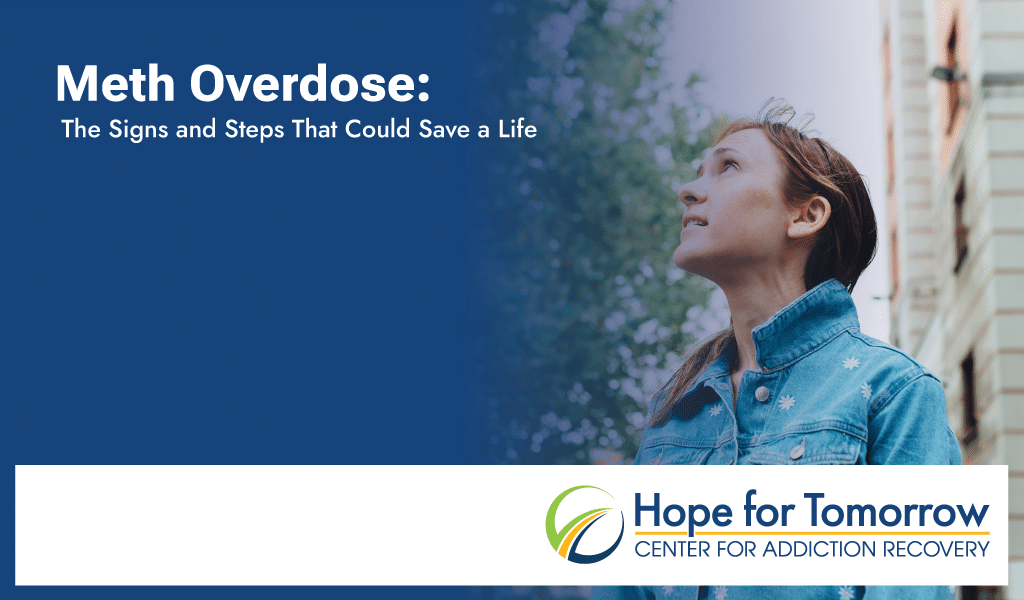

52% of drug overdose deaths in West Virginia involved meth in 2021. That’s up 30% since 2017.
If you have a loved one using meth, the long-term impact it has on their health is a concern, but overdose is one of your biggest fears. It’s understandable.
The good news is, meth overdose is preventable, and when overdoses do happen, they don’t have to be death sentences. At Hope for Tomorrow, we’ve met countless people whose experiences with overdoses are what prompted them to seek the treatment that led to their recovery.
What leads to those outcomes, instead of someone contributing to another tragic statistic? It’s quality care for addiction, but it’s also education for everyone who might encounter a meth overdose in their lives. We want you to understand meth overdose on a deeper level, how to recognize it, and what to do in the event of one. Read on for what you need to know.
A meth overdose is when your body has a toxic reaction to methamphetamine – a stimulant most frequently made and used illicitly. This can happen due to taking too much meth all at once, or taking too much over time – before your body has a chance to detox it all. When your body is overwhelmed by a toxic substance like meth, it can’t get rid of it quickly enough to prevent it from harming you. This is especially true when you add other substances, like opioids, alcohol, or other stimulants, to the mix. You can think about it like you’re bombarding your body with different toxins from multiple angles. Naturally, your body will have a harder time defending you from all of it than it would with any single substance.
Symptoms of meth overdose vary from person to person, which can make it difficult to spot warning signs. This is especially true if the person took meth with other substances. That being said, there are still common symptoms of meth overdose you can look out for. These include:
When combined with opioids, the person might experience trouble breathing, very small pupils, or fall in and out of consciousness.
An overdose can cause serious damage to the brain and other organs. It will primarily hurt your heart, kidneys, and brain, and any harm it causes is often permanent. Lasting mental health symptoms are common, including potential psychosis, paranoia, and memory complications. Permanent paralysis is also a possibility. Meth overdose can also be deadly.
How much damage an overdose does depends on how quickly the person gets medical help.
If you’re afraid someone is overdosing, it’s always better to be safe and assume they are.
Call 911. West Virginia’s Good Samaritan Laws will keep you safe from any legal repercussions that might make you hesitate, so don’t be afraid to provide them with all the information you can about the person overdosing. Symptoms are most important to mention, but age, weight, how much meth they took, when they took it, and how they took it are all helpful for emergency responders to know.
If you have naloxone and you see symptoms of an opioid overdose, administer it. Administer it if you have any concern whatsoever that opioids are involved, because naloxone won’t hurt even if meth is the only contributing factor. Stay with the person until help arrives, try to keep them awake, and if they need to lay down, lay them on their side to keep them from choking if they throw up.

Anyone who takes meth is at risk of an overdose. This is especially true in recent years, where fentanyl, a dangerous opioid, is often mixed into meth without the knowledge of the person taking it. This is because “cutting” the supply of meth with fentanyl is cheaper for dealers and suppliers, and it’s easy, too – powdered fentanyl resembles meth, and it’s practically impossible to tell them apart.
While anyone is at risk, there are often some common characteristics between people who experience a meth overdose.
People with substance use disorders are significantly more likely to overdose than people who are trying meth for the first time. This is because they take larger amounts of meth, often without letting their body detox the previous dose. They’re also more likely to take other substances alongside meth, which substantially increases the risk of overdose, too.
The factors that make substance use disorders more likely also make a meth overdose more likely. Some of those include:
People with these risk factors are more likely to experience the emotional pain that leads to substance use disorders, including meth addiction, and to use larger amounts of meth. Frequent exposure to meth can lead to an underestimation of its negative effects even in someone who has only taken it once or twice, which can cause them to take more than their body can handle and overdose.
The only way to truly prevent an overdose is not to use meth in the first place. If that isn’t realistic for you, using fentanyl test strips on your meth is also a good idea. This will identify if there’s any fentanyl in your meth supply, and if your meth is fentanyl-free, your chance of overdose is significantly lower. If there is fentanyl in your meth, don’t risk it, and don’t take it.
Your chance of overdosing on meth is significantly higher when you combine it with any other substance, not just fentanyl, though it’s the most dangerous. By avoiding taking multiple substances around the same time as you use meth – including alcohol or prescription medications – you’ll be less likely to overdose.
If you’re returning to meth use after abstaining for a while, keep in mind that your body will likely have a lower tolerance for meth now. That means you should start at a lower dose than you might think you need to make sure your body can handle it, lowering the chance of overdosing.
If you must take meth, it’s better not to do it alone. Have at least one person you trust with you who can help if something goes wrong.
If you’re concerned about meth overdose, there’s no better time to get treatment and turn away from meth than the present.

Whether you’re the one with a meth addiction, or you’ve watched the consequences meth has had on your loved one’s life, getting over the final hurdles and through the door of an addiction recovery center isn’t easy. Take it one step at a time. It starts with a single step: making a call. You can ask all the questions you need to feel comfortable.
Then, you’ll have multiple options. Meth addiction rehab usually involves a stay at a facility while you undergo therapy to address every aspect of meth use disorder. Outpatient programs are also available if you can’t step away from your entire life to focus on treatment. You can discuss what will work best for you with the center you contact.
What matters most right now is taking that first step, and we hope you will. It’s the start of your journey to recovery.
Hope for Tomorrow is an addiction recovery center with locations in Point Pleasant and Beckley, West Virginia. We offer multiple levels of care, including outpatient and inpatient programs for meth use disorder. We’re passionate about bringing comprehensive, dual-diagnosis care to everyone in need. If you’ve felt unwelcome at other treatment centers, we encourage you to take a chance on us. Veterans, pregnant women, people with additional medical conditions, and couples seeking recovery together are all met with respect and open arms here, as is anyone else. Give us a call at 877-679-8162 to learn more about how we can help.
Treatment today for a brighter tomorrow.